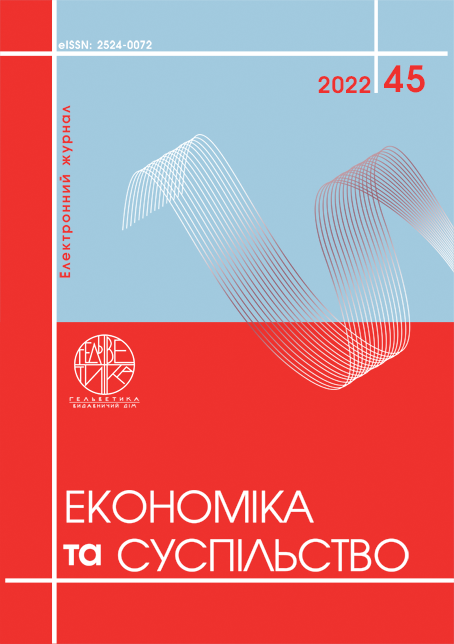ENTERPRISE EXPENSES AND THEIR MANAGEMENT
Abstract
The article reveals the meaning of expenses and their management as an economic category that leads to the efficiency of the enterprise's economic activity, namely: to the expansion of production, increase of equity capital, which means an increase in the solvency of the enterprise. The purpose of this work is the study and analysis of theoretical approaches to the terms "costs", "cost management". Investigating the concepts of "expenses" and "expense management", the idea arises that costs are the value of using all types of resources (material, financial, labor, information) to achieve the enterprise's goal. The article noted that costs, either positively or negatively, affect the process of management decision-making regarding management at the enterprise. In this regard, it is necessary to deal in theory and practice with such an important problem as cost management, which is one of the components of the management system. The article examines expenses by their qualification groups, which are necessary for specialists to make decisions regarding the effective management of a business entity. Also, such concepts as "costs" and "expenditures" were studied because these concepts are distinguished in the economic literature according to the principle – costs refer to the structure of resources, and expenses – to operational activities and require funds for their payment. Part of the expenses related to the financial and investment activities of the enterprise are included in the cost price in accordance with the legislation. Therefore, the distribution of resources according to the areas of activity is an integral part of management. In economic literature, scientists interpret approaches to cost management in various aspects (integrative, dynamic, structural, situational, systemic approaches). Thus, cost management is a multifaceted, complex, purposeful process of cost formation, which ensures the achievement of the strategic goal of the enterprise's economic activity. Cost management methods, as "management tools" (models, methods and concepts), which are necessary for solving the economic activity of the enterprise, are also considered.
References
Атамас П. Й. Управлінський облік : навч. посібник. Київ : Центр навчальної літератури, 2006. 440 с.
Великий Ю. М., Прохорова В. В., Сабліна Н. В. Управління витратами підприємства : монографія. Харків : ІНЖЕК, 2009. 192с.
Задорожна Н. В. Мікроекономічна теорія виробництва і витрат : навч. посібн. Київ : КНЕУ, 2003. 219 с.
Грещак М. Г. Управління витратами : навч.-метод. посібн. для самост. вивч. дисц. Київ : КНЕУ, 2002. 131 с.
Гапоненко А. Л., Савельєва М. В. Теорія управління. URL: https://stud.com.ua/31796/menedzhment/teoriya_upravlinnya (дата звернення 12.12.2022).
Козаченко Г. В., Погорєлов Ю. С., Хлапьонов Л. Ю., Макухін Г. А. Управління затратами підприємства : монографія. Київ : Лібра, 2007. 320 с.
Горлова Е. И. Инструменты управления затратами в системе управления предприятием. Экономинфо. 2012. № 17. С. 30–34.
Клюс Ю. І., Персій Ю. О. Стратегічні напрями підвищення ефективності управління затратами промислових підприємств в умовах забезпечення сталого розвитку регіону. Забезпечення сталого розвитку регіону: економічні, управлінські, правові та інформаційно-технічні аспекти : колективна монографія / заг. ред. Ю. І. Клюс, Н. В. Швець. Сєвєродонецьк : СНУ ім. В. Даля, 2017. С. 332–346.
Турило А. М., Кравчук Ю. Б., Турило А.А. Управління витратами підприємства: навч. посібник. К.: Центр навчальної літератури, 2006. 120 с.
Труніна І. М., Онищенко О. В. Методичні підходи до управління затратами промислових підприємств. Modern Ekonomics. 2018. № 7. С. 182–191.
Скрипник М. І. Затрати і витрати: проблема трактування понять. Міжнародний збірник наукових праць. 2009. Вип. 1 (13). С. 236–240.
Скляренко В. К. Экономика предприятия:учебник. Москва : ИНФРА-М, 2006. 528 с.
Цал-Цалко Ю. С. Витрати підприємства : навч. посібн. Київ : ЦУЛ, 2002. 656 с.
Atamas P. Y. Upravlinskyi oblik: navch. posibnyk. Kyiv: Tsentr navchalnoi literatury, 2006. 440 s.
Velykyi Yu. M., Prokhorova V. V., Sablina N. V. Upravlinnia vytratamy pidpryiemstva: monohrafiia. Kharkiv: INZhEK, 2009. 192 s.
Zadorozhna N. V. Mikroekonomichna teoriia vyrobnytstva i vytrat: navch. posibn. Kyiv: KNEU, 2003. 219 s.
Hreshchak M. H. Upravlinnia vytratamy: navch.-metod. posibn. dlia samost. vyvch. dysts. Kyiv: KNEU, 2002. 131 s.
Haponenko A. L., Savelieva M. V. Teoriia upravlinnia. URL: https://stud.com.ua/31796/menedzhment/teoriya_upravlinnya (12.12.2022).
Kozachenko H. V., Pohorielov Yu. S., Khlaponov L. Yu., Makukhin H. A. Upravlinnia zatratamy pidpryiemstva: monohrafiia. Kyiv: Libra, 2007. 320 s.
Horlova E. Y. Ynstrumenty upravlenyia zatratamy v systeme upravlenyia predpryiatyem. Ekonomynfo. 2012. № 17. S. 30–34.
Klius Yu. I., Persii Yu. O. Stratehichni napriamy pidvyshchennia efektyvnosti upravlinnia zatratamy promyslovykh pidpryiemstv v umovakh zabezpechennia staloho rozvytku rehionu. Zabezpechennia staloho rozvytku rehionu: ekonomichni, upravlinski, pravovi ta informatsiino-tekhnichni aspekty: kolektyvna monohrafiia / zah. red. Yu. I. Klius, N. V. Shvets. Sievierodonetsk: SNU im. V. Dalia, 2017. S. 332–346.
Turylo A. M., Kravchuk Yu. B., Turylo A.A. Upravlinnia vytratamy pidpryiemstva: navch. posibnyk. Kyiv: Tsentr navchalnoi literatury, 2006. 120 s.
Trunina I. M., Onyshchenko O. V. Metodychni pidkhody do upravlinnia zatratamy promyslovykh pidpryiemstv. Modern Ekonomics. 2018. № 7. S. 182–191.
Skrypnyk M. I. Zatraty i vytraty: problema traktuvannia poniat. Mizhnarodnyi zbirnyk naukovykh prats. 2009. Vyp. 1 (13). S. 236–240.
Skliarenko V. K. Ekonomyka predpryiatyia: uchebnyk. Moskva: YNFRA-M, 2006. 528 s.
Tsal-Tsalko Yu. S. Vytraty pidpryiemstva: navch. posibn. Kyiv: TsUL, 2002. 656 s.


